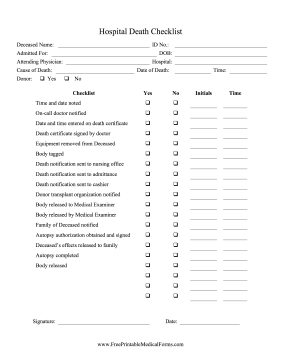Essential Paperwork You Need After Someone Dies

When a loved one passes away, dealing with the emotional turmoil can be overwhelming, and the legal and administrative responsibilities that follow can add to the stress. Knowing the essential paperwork you need after someone dies can help you navigate this difficult time more smoothly. Here's a comprehensive guide to managing these tasks efficiently.
Death Certificate

Immediately after someone’s death, obtaining a death certificate becomes your primary task. This legal document, issued by the doctor or coroner, certifies the time, place, and cause of death. Here are the steps to follow:
- Contact the funeral home or medical facility where the death occurred to initiate the process.
- You will need multiple copies of the death certificate. While you can often get one certified copy for free, additional copies come at a fee, generally ranging from 5 to 25 per copy.
- These copies are vital for settling the deceased’s estate, claiming insurance, updating government records, and many other necessary administrative tasks.
⚠️ Note: Ensure you have the correct number of certified copies since replacing them later can be time-consuming and costly.
Will and Testament

The last will and testament outlines how the deceased wished their assets to be distributed after their passing. Here’s what to do:
- Locate the will. It’s usually with the deceased’s personal belongings or with their attorney.
- If there’s a named executor in the will, they must file it with the probate court.
- In cases where there is no will, the state will determine inheritance through intestacy laws.
Financial Statements

Reviewing and organizing the financial records of the deceased is crucial. This includes:
- Bank statements to freeze accounts and manage financial affairs.
- Investment documents such as stocks, bonds, and mutual fund statements.
- Retirement accounts, including IRAs, 401(k)s, or pensions.
- Credit card statements to pay off or cancel credit cards and manage outstanding balances.
- Tax documents - the latest tax filings can provide insight into assets, debts, and potential income sources.
Insurance Policies

Identify and gather insurance policies, as they might cover various expenses related to the death:
- Life insurance policies can provide financial relief to the beneficiaries.
- Health or long-term care insurance could cover medical or funeral expenses.
- Home, auto, or personal property insurance might also need to be adjusted or canceled.
To claim on these policies:
- Contact the insurance provider.
- Provide the death certificate and any required additional documentation.
🔍 Note: Insurance companies might require detailed information or additional forms, so keep all documents handy.
Property Deeds

Understanding the deceased’s property ownership is essential for estate settlement. You’ll need:
- Deeds for any real property owned by the deceased.
- Vehicle titles for cars, boats, or other motor vehicles.
- Any other deeds or titles for personal property.
Social Security and Benefits

If the deceased was receiving Social Security or other benefits, you must:
- Notify Social Security Administration (SSA) immediately.
- Apply for any survivor benefits you may be eligible for.
- Understand and claim benefits like Medicare, veteran’s benefits, or pension rights.
| Document Type | Importance |
|---|---|
| Death Certificate | Legal proof of death; required for numerous official transactions |
| Will | Guides the distribution of assets as per the deceased's wishes |
| Financial Statements | Essential for estate settlement and managing finances |
| Insurance Policies | Provides financial support or covers expenses related to the death |
| Property Deeds | Critical for managing property rights and distribution |
| Social Security | Notifying SSA helps avoid overpayments and secures benefits |

As you work through this process, maintaining clear communication with all involved parties is key. This can include family members, legal professionals, financial advisors, and government agencies. Here are some additional steps to consider:
- Consult with an estate attorney to navigate probate laws and legal requirements.
- Settle any outstanding debts to prevent issues with creditors.
- Ensure that the deceased’s utilities and subscriptions are canceled or transferred to avoid unnecessary charges.
- Finally, ensure that the deceased's Social Security number is protected from identity theft.
Handling the affairs of a loved one who has passed away is a challenging task, not only emotionally but also administratively. By following this guide, you can make the process smoother and less daunting. Remember to:
- Keep everything organized with a systematic approach.
- Seek professional help when needed, especially in legal and financial matters.
- Communicate with all relevant parties to ensure all documentation is correctly filed.
- Keep the deceased's memory honored by fulfilling their wishes as best as you can through the legal and administrative procedures.
This guide aims to help you through the essential paperwork required after a death, ensuring you are well-prepared to handle this delicate and important task.
What should I do if I can’t find the will?

+
If you cannot locate the will, the estate will be distributed according to intestacy laws, which might not align with the deceased’s wishes. It’s advisable to perform a thorough search and possibly hire a professional to help locate any legal documents.
How many death certificates should I order?

+
The number of death certificates varies by case, but a rule of thumb is to order at least 10-15 copies. This covers insurance claims, estate matters, financial institutions, and governmental agencies, among others.
How long does the probate process take?

+
The duration of probate varies widely depending on the complexity of the estate, state laws, and whether the will is contested. It can range from a few months to several years. Consulting with an attorney can help expedite the process.
Can I manage all this paperwork alone?

+
While possible to manage on your own, having an estate attorney can be invaluable, especially if there are disputes, significant assets, or complex legal requirements to navigate. They can also guide you through the probate process and ensure all legalities are correctly followed.



